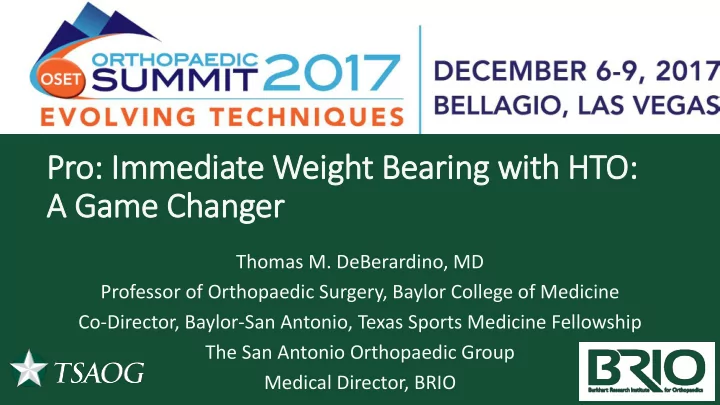

OSET Pro: o: I Immed ediate W e Weight Be Bear aring ng with H HTO: A Gam A ame Cha e Changer er Thomas M. DeBerardino, MD Professor of Orthopaedic Surgery, Baylor College of Medicine Co-Director, Baylor-San Antonio, Texas Sports Medicine Fellowship The San Antonio Orthopaedic Group Medical Director, BRIO
Disclosure • The following relationships with commercial interests related to this presentation existed during the past 12 months: • Research support: MTF and Arthrex • Consultant: Arthrex, MTF • Dr. DeBerardino does not intend to discuss the use of any off-label use/unapproved use of drugs or devices
Goals of Talk: • Discuss safety and efficacy of iBalance HTO implant • Early weight bearing study • Highlight new technology for guided or free-hand iBalance HTO
Goals of HTO • Realign extremity • Decrease pain • Improve overall function • Restore mechanical environment • Decrease force on ligaments & grafts
HTO Indications • Unicompartmental arthritis • Varus Deformities • Cartilage Restoration Procedures • Meniscus Transplantation • Osteochondral transplantation • Cartiform • Bio- Cartilage
Decades of Opening Wedge Osteotomies
It is All About the Hinge Pin • The hinge pin technique reduces drastically the risk of lateral cortex fracture • Stress homogenization in the area of the drill hole • Avoids locally high stress concentrations in the region of the sharp cutting notch • Definitive TRUE VALGUS ostoeotomy
Freehand Technique
Guide Pin, Cannulated Drill, and Hinge Pin
Hinge Pin Guide Pinned in Place
Making the Cut European cut
HTO FreeCut- Still Protect N-V structures!
FreeCut Guide
Open Osteotomy Desired Distance
Implant Placement
Secure, Quickset, Close
Recent Case
Hinge Pin Placement
Protected Osteotomy Cut
Completed HTO Cut and Opening Jig
Peek Fasteners Placed
Guided FreeHand vs FreeCut- An Option for All
Recent Clinical Trial • Scordino LE, DeBerardino TM. Surgical treatment of osteoarthritis in the middle-aged athlete: new horizons in high tibial osteotomies. Sports Med Arthrosc. 2013 Mar;21(1):47-51
Hypothesis • Time to full weight bearing will be significantly reduced in group allowed to bear weight as tolerated and healing will not be compromised
Block Randomization: Two Treatment Arms • Group I • Group II • TTWB 6 wk • WBAT • Pain ≤ 3 • Off narcotics Standard HTO using the PEEK iBalance implant with Osferion and ACP ROM locked brace 6 wk
Outcome Measures • 1 0 Outcome Measures • Time to FWB • Healing on Radiographs • 2 0 Outcome Measures • WOMAC • Hematoma, Bleeding • Pain & Medication Use
Data Points WOMAC, Pain and Medication, PRE OP Radiographs 1 WK Pain and Medication, Radiographs 6 WK WOMAC, Pain and Medication, Radiographs WOMAC, Pain and Medication, 12 WK Radiographs WOMAC, Pain and Medication, 6 MONTH Radiographs
All patients undergoing HTO from my practice N=40 Excluded 2 language barrier, 1 did not enroll Enrolled N=37 Withdrew: 1 workers comp, 1 fracture- subchondral cyst N=35 Early Toe Touch N=18 N=17 Group 2 Group 1
Time to D/C of Crutches Days Until Full Weight Bearing 45 40 42 days* (42- Average 12 days* (2-21) post-op in 35 56) the early group before no crutches 30 needed 25 20 15 10 5 0 Rapid WB Delayed *significantly different, p < 0.05
Summary: Key Highlights • Growing need for knee realignment and joint preservation procedures • HTO evolved from “freehand procedure” to guided, predictable/reproducible procedure
Conclusions: iBalance HTO Game Changer • No increased complications • Slope, correction maintained • Early weight bearing appears safe and efficacious for HTO “Invisible” PEEK Standard Bulky • No difference +/- ACLR iBalance, OsFerion, ACP Hardware
Take Home Points- iBalance HTO • iBalance HTO remains best in class option for OWHTO • Only system that obtains true valgus slope maintaining osteotomy • Hinge Pin is the key • Safe, reproducible, maintainable results. LOW morbidity • Standard biplanar alignment guide is really freehand jigged bony cut • Hinge Pin & FreeCut guides are newest option for surgeons based on personal preference
Thank You Questions?
Recommend
More recommend